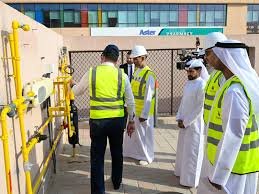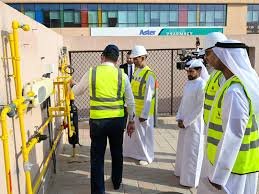Driving Strategic Changes for the Energy Sector
Abu Dhabi Petroleum Products Trading Regulation Committee convened its second meeting of the year, reaffirming the emirate’s commitment to enhancing the regulatory landscape surrounding petroleum trading. With an agenda packed with impactful decisions and forward-thinking discussions, the session marked a defining moment in the UAE’s ongoing strategy to solidify its position as a global energy leader.
The meeting brought together top government representatives, key stakeholders in the petroleum sector, and regulatory authorities—each unified by a shared vision to improve transparency, compliance, and sustainability in the fuel trade.

Building on the First Meeting’s Momentum
The committee’s first meeting earlier this year laid the foundation for comprehensive regulatory frameworks aimed at tightening oversight, eliminating malpractices, and encouraging innovation in the petroleum trading ecosystem. The second meeting served as a continuation of this momentum, focusing on the implementation phase of several earlier recommendations and introducing a set of new policy ideas.

The atmosphere was one of purposeful collaboration, as members reviewed progress reports and discussed the practical outcomes of their initiatives so far. There was a clear sense that this wasn’t just another policy talk—it was action in motion.

Regulatory Compliance Takes Center Stage
A key highlight of the discussion was the focus on compliance enforcement. Committee members explored mechanisms to ensure every company involved in the trade of petroleum products is properly licensed and meets the criteria outlined by Abu Dhabi’s regulatory standards. This includes detailed record-keeping, verified trading histories, and transparent documentation of fuel origins and destinations.
There was a clear consensus: a strong regulatory backbone is essential not only for market fairness but also for attracting international investors. By creating an environment where rules are enforced uniformly, Abu Dhabi hopes to position itself as a secure and reliable hub for petroleum commerce.
Supporting Sustainability and Responsible Trading
In alignment with the UAE’s Net Zero by 2050 goals, the committee also examined the role of environmentally responsible trading practices. A portion of the meeting was dedicated to brainstorming how trading regulations can better reflect climate goals and incentivize the adoption of clean energy fuels and technologies.
The members proposed future strategies to gradually integrate sustainability benchmarks into the regulatory framework. These could include carbon reporting requirements for fuel traders and prioritising partnerships with eco-conscious suppliers.
While the transition won’t happen overnight, the committee is clear in its direction—responsibility and profitability can go hand in hand when the right policies are in place.
Creating a Level Playing Field
Another point of emphasis was the need to create a level playing field for all petroleum traders operating within Abu Dhabi. This means cracking down on unlicensed or grey-market operators, and making sure that companies engaged in fuel import, export, and re-export adhere to the same high standards.
Committee members stressed the importance of market integrity, noting that legal clarity and fairness attract legitimate players while discouraging misconduct.
The dialogue reflected a proactive mindset: Abu Dhabi is not just catching up with global standards—it is aiming to set new ones.

Empowering Traders Through Transparency
Transparency emerged as a recurring theme throughout the meeting. The committee discussed creating centralized digital systems where licensed traders can log and monitor their activities, making it easier for regulators to ensure compliance and for traders to manage their operations with confidence.
These systems could also offer tools for dispute resolution, license renewal, and compliance training. The end goal is to build a connected community of traders who are informed, supported, and engaged with the evolving regulatory environment.
This digital-first approach is particularly important in a region where technology continues to shape the way industries operate. By embracing innovation, the committee is helping to future-proof Abu Dhabi’s petroleum sector.
Next Steps: More Collaboration, Greater Accountability
One of the biggest takeaways from the meeting was the importance of multi-agency coordination. Regulatory frameworks are only effective when there is synergy among the entities involved—customs, environmental agencies, trade departments, and law enforcement.
The committee plans to organize future cross-departmental workshops and feedback sessions, ensuring that every arm of government and industry remains aligned in vision and execution.
Moreover, accountability measures will be strengthened. Companies that fail to comply with regulations may face penalties, license suspensions, or public blacklisting. This is intended to send a clear message: compliance is not optional—it is the foundation of doing business in Abu Dhabi.
A Future Built on Trust and Progress
As the meeting wrapped up, it became clear that Abu Dhabi is building something far more significant than just a set of trading rules. It’s crafting a vision for the future—one that balances growth with responsibility, tradition with innovation, and regulation with opportunity.
The Petroleum Products Trading Regulation Committee’s work is not just about control; it’s about empowerment. It empowers traders with clarity, consumers with safety, and the country with a stronger economic backbone.
The decisions made in this second meeting of 2025 may not make daily headlines, but they are laying the groundwork for a cleaner, more competitive, and more credible energy market.
For industry players and policymakers alike, the message is clear: Abu Dhabi is raising the bar—and those who trade petroleum products within its borders must rise to meet it.

A Sign of Things to Come
With more meetings expected in the months ahead, the committee remains committed to refining and enforcing policies that benefit the entire ecosystem. Each session brings the emirate one step closer to becoming a global model in fuel trading governance.
As the world watches the Gulf region evolve, Abu Dhabi’s leadership in this area is not just timely—it’s transformational. And with every policy enacted and every regulation clarified, the future of petroleum trading in Abu Dhabi looks brighter than ever.
Do follow UAE Stories on Instagram













